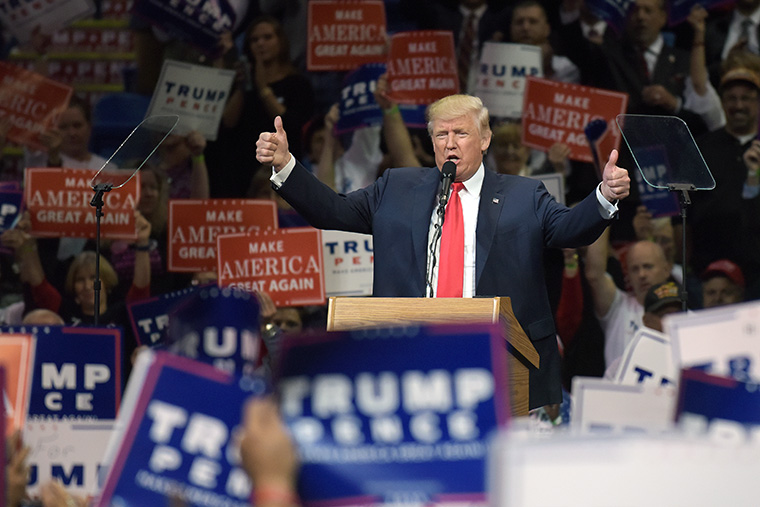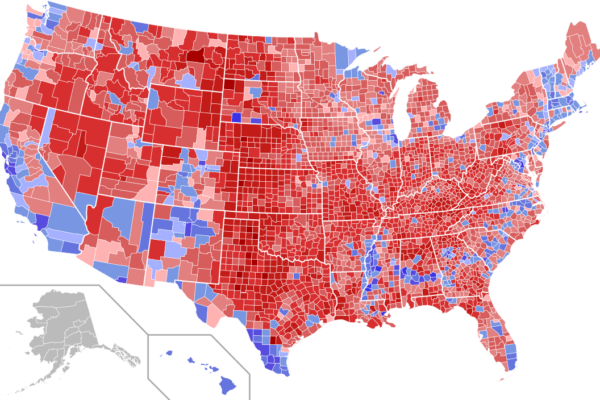Over the last century, only five American presidents — Herbert Hoover, Gerald Ford, Jimmy Carter, George H.W. Bush and Donald Trump — have lost their bid to stay in the White House. What did they have in common? A poor economy.
“Few issues are more salient for voters or more important in political decision making than economic conditions, and no American public official is more closely associated with the economy than the president,” said Andrew Reeves, professor of political science in Arts & Sciences at Washington University in St. Louis.

But given the highly polarized nature of American politics today, are voters able to objectively assess the economy?
Reeves’ newest research — published in the American Journal of Political Science with Zoe Ang of Washington University; Jon C. Rogowski of the University of Chicago; and Arjun Vishwanath of Harvard University — examined how partisanship loyalties shape economic assessments.
The findings — gleaned from 16 months of survey data collected before and after the 2016 election — showed that perceptions of one’s personal financial situation are largely stable across time, regardless of which party controls the presidency.
As for the overall U.S. economy, the change in partisan control of the White House was associated with more positive evaluations among Republicans and more negative evaluations among Democrats. However, the effect was modest in magnitude, according to Reeves, suggesting that partisanship is less strongly associated with economic assessments than some previously believed.
“Our research shows that presidential accountability is still alive,” Reeves said. “Partisans don’t simply reverse their assessment of the economy when a different party holds the presidency. They may actually hold presidents accountable for the economic realities on the ground and the president’s ability to shape them.”
What happened in 2016?
The 2016 election was the most polarized election in decades. The average partisan gap in candidate evaluations was larger than in any other presidential election year since 1968, and an unusually large percentage of respondents provided the most negative possible rating of the opposing party’s candidate, according to Reeves.
With unified control of the presidency and Congress, Republicans were free to advance Trump’s economic policy objectives. But that also meant that voters were able to assign responsibility for those policy outcomes. Given the increased divide among Republicans and Democrats on economic policies, one might expect partisan loyalties to cloud individuals’ economic assessments. However, the research shows that didn’t happen — at least not right away and not to the magnitude expected.
“Our research shows that presidential accountability is still alive.”
Andrew Reeves
Instead, shifts in economic perceptions were more gradual. The data confirmed that sharing the partisanship of the incumbent president was associated with more positive evaluations of the economy. Following the 2016 election, there was a slight increase in positive assessments among Republicans and negative assessments among Democrats. The trend accelerated somewhat from January 2017, when Trump was inaugurated, to April, but the trends remained largely linear. And it wasn’t until July 2017, six months after Trump took office, that Republican evaluations surpassed those of Democrats.
Notably, the difference in economic assessments between strong in-partisans and out-partisans was relatively small — about one-tenth of the full range of collected responses. Republicans reported a larger shift in economic perceptions than Democrats, but researchers could not say for certain what explains this difference.
“It’s hard to separate out whether it’s because they are Republicans or because they are co-partisans with the new president,” Reeves said.
“It could be the Republicans are more willing to shade their perceptions of the economy as a function of partisanship. It could also be that out-partisans, those who don’t share the party of the president, are harsher than in-partisans are rewarding. So out-partisans may bounce back in their new positive evaluations more strongly than in-partisans become gloomy about the state of things.”
The research also showed that objective economic indicators impacted how individuals perceive economic conditions. National unemployment rates influenced perceptions of household conditions while the Dow Jones Industrial Average was positively and significantly associated with individual evaluations of the national economy.
According to Reeves, the findings suggest that economic perceptions are influenced by both partisanship and national economic conditions.
“Neither the election outcome nor the change in presidential administration was associated with wholesale changes in how Americans of either party perceived their economic circumstances,” Reeves said. “While some partisan separation in economic evaluations occurred over time, there was not a marked shift immediately after the election.”
Are the findings specific to 2016?
Interestingly, the patterns between partisanship and economic assessments found in this research from the 2016 election are similar to shifts that occurred in 2008. Drawing from these conclusions, one could expect partisan evaluations of the economy to become stronger as Joe Biden’s presidency goes on. However, the COVID-19 pandemic has put the current economy in a precarious position, Reeves explained.
“Current economic evaluations are quite dismal, with a much narrower partisan gap than when the economy was booming. It could be that partisanship is even weaker when the economy is bad or worsening. It’s harder to adjust our opinions to suit our partisanship when really bad things are happening,” he said.


